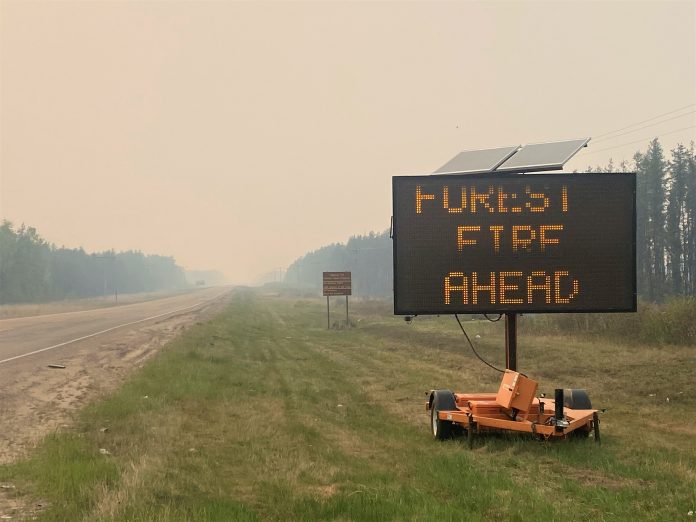
As wildfire continues to push the boundaries of their homes and threaten the safety of their residents, two northern Sask. communities are left feeling like they’re on their own.
“The Saskatchewan Public Safety Agency (SPSA) has gone silent, and we haven’t been able to get an up-to-date status on the fire pushing towards Patuanak for more than 24 hours now,” Emergency Management Coordinator for Patuanak and La Plonge, Candyce Paul said on Saturday.
“We should have a direct line; we are the ones on the ground dealing with the situation.”
Neither the provincial nor federal governments have prepared enough since Saskatchewan wildfires forced thousands of people from their northern homes back in 2015, said Paul.
The lack of support in previous years has pushed the communities to prepare themselves in advance for what they knew was coming with this season’s hot and dry summer conditions.
“We’ve taken it on in English River pretty much ourselves, with very limited funding,” said Paul. “We knew since 2015 that we’ve got to look after ourselves, but the thing is, we don’t have the equipment [and] we don’t have the resources.”
According to Paul, having access to emergency items like their own propane tanks and generators is one of the biggest needs for La Plonge.
After receiving advanced warning from the SPSA that wildfire was coming in close to the area, Meadow Lake Tribal Council (MLTC) was able to help coordinate evacuation efforts to send community members to North Battleford with the support of the Emergency Management Team.
MLTC has taken on a huge role in supporting the people of Patuanak and La Plonge, said Paul.
“It’s a big operation trying to move a whole community of people, it’s a lot of responsibilities,” said Paul. “We have a team of our health staff and our teaching staff and other members of the administration, many of them are down in North Battleford looking after the needs of the people.”
Paul said fully funded emergency management teams should be set up in every northern and remote community, so residents aren’t left scrambling to deal with emergency situations by themselves.
“Hopefully we can advocate for that in the future; we have to,” said Paul. “This is not the first disaster, and this will not be the last.”
The worst is yet to come, she added.
“This is an era of climate chaos, and this is the tip of the iceberg,” said Paul. “Later this summer, we may be dealing with fire and heat, and that’s going to be really hard on our people.”
Dealing with the uncertainty of the COVID-19 pandemic gave the Emergency Management Team an opportunity to start addressing what was needed in the communities in preparation for their next emergency.
The team’s main takeaway was that communication is essential.
“For us to keep our people informed, that helps keep them calm. It gives them a sense of how long they’re going to be in this situation, so they can wrap their heads around it. It relieves a lot of stress,” said Paul. “The uncertainty is really bothersome for some people.”
Paul is unsure when the people of Patuanak and La Plonge will be able to make their way home but asked that everyone keeps praying for rain.

